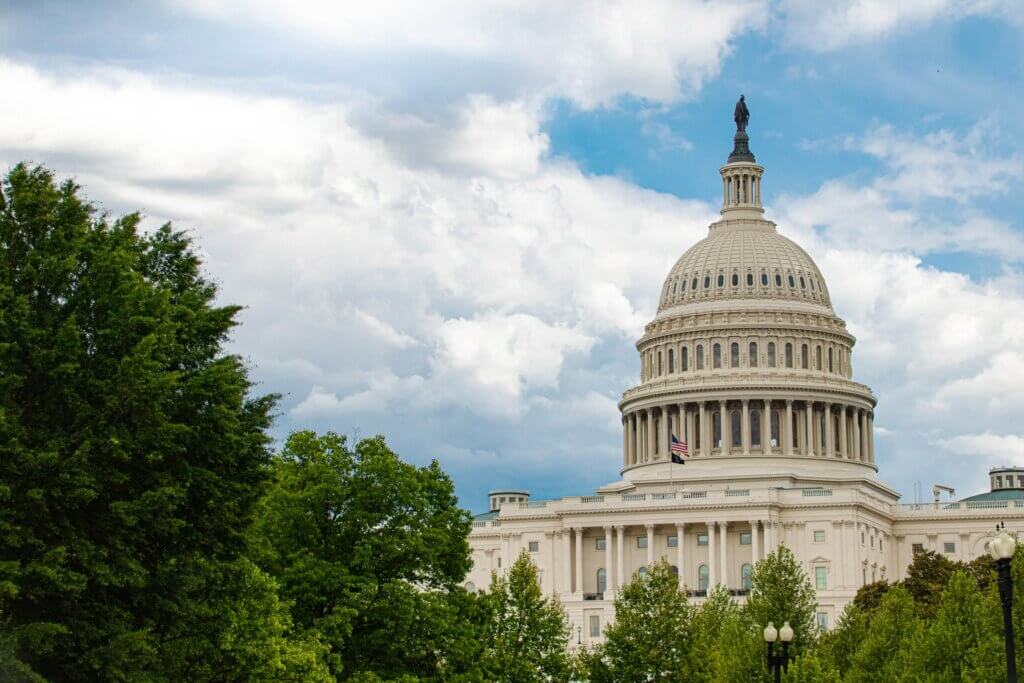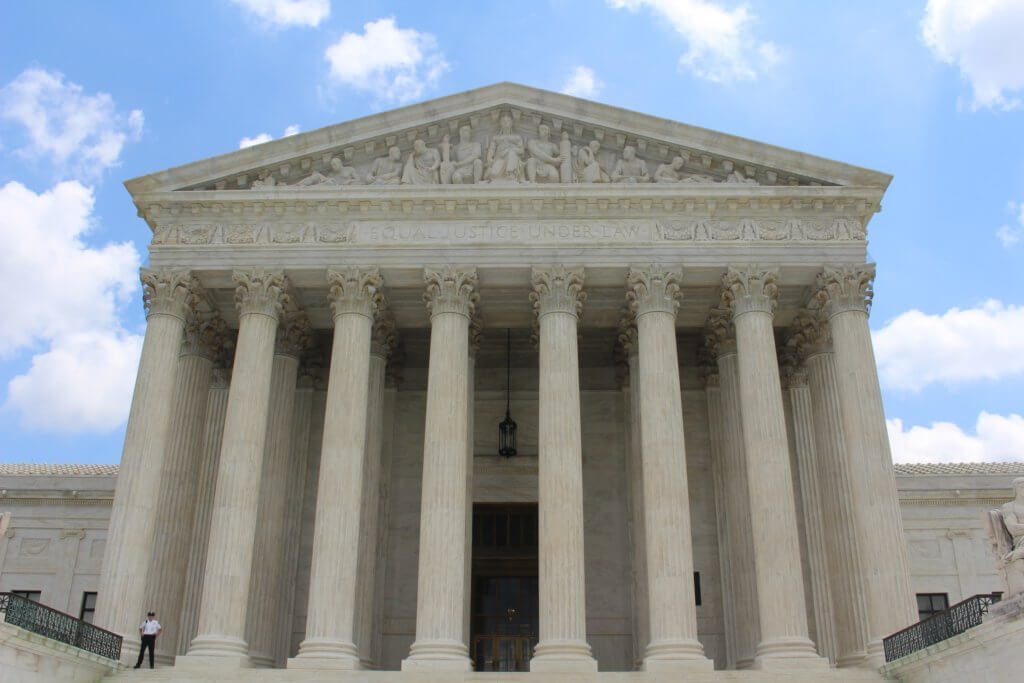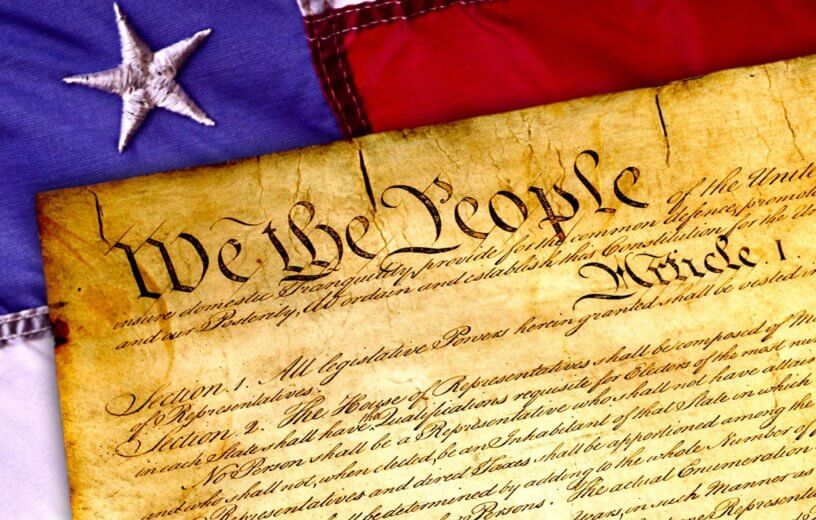PHILADELPHIA — The U.S. Constitution was a collaborative effort undertaken by many of America’s Founding Fathers. James Madison played an especially crucial role in drafting the supreme law of the U.S., and as such is often referred to as the “Father of the Constitution.” One can’t help but wonder what President Madison would think about the results of a new survey by the Annenberg Public Policy Center of the University of Pennsylvania. In short, the poll suggests a troubling number of Americans are incredibly uninformed when it comes to their own constitutional rights.
Even worse, the 2023 Annenberg Constitution Day Civics Survey, an annual poll released every Constitution Day (Sept. 17), also found that a significant number of Americans can’t even name the three branches of the government. More specifically, while two-thirds of Americans (66%) can name the three branches, 10 percent can only list two, another seven percent can only name one, and an astounding 17 percent can’t name a single branch.
Meanwhile, when respondents were asked to name all of the rights guaranteed by the First Amendment to the Constitution, most Americans (77%) could only name one — the freedom of speech.
This latest version of the survey was put together during an especially turbulent year in America filled with high-profile events that brought the inner workings of the U.S. government into the news cycle on a daily basis. These include trials for those charged in the Jan. 6 riot on the U.S. Capitol, multiple criminal indictments aimed at President Trump, and the Supreme Court overturning Roe v. Wade and the Biden Administration student loan forgiveness plan. Several Supreme Court justices were also accused of unethical conduct and House Republicans have begun the process to open impeachment proceedings against President Biden.
“It is worrisome that one in six U.S. adults cannot name any of the branches of government and that only 1 in 20 can name all five freedoms protected by the First Amendment,” says Kathleen Hall Jamieson, director of the Annenberg Public Policy Center and director of the survey, in a media release. “One is unlikely to cherish or work to protect freedoms one does not know one has and will have trouble holding elected and unelected leaders accountable if one does not understand the nature and prerogatives of each branch and the ways in which the power of each is kept in check.”

Do Americans know what freedom of speech is?
Besides freedom of speech (77%) being the most widely remembered right guaranteed by the First Amendment, another 40 percent of Americans were able to name freedom of religion, 33 percent could name the right to assembly, 28 percent remembered freedom of the press, and a meager nine percent recalled the right to petition the government. In total, just five percent of U.S. adults could correctly cite all five First Amendment rights, and 30 percent named three or four. Just under half (46%) named one or two First Amendment rights, and 20 percent could not name a single right.
Interestingly, over one in five Americans (22%) responded to that question by listing the right to bear arms – which is a right granted under the Second Amendment, not the First.
So, if one trend is clear, it’s that the vast majority of Americans are at least aware of freedom of speech – but just how much do people actually understand what that right entails? Over half (53%) of respondents consider it accurate to say the Constitution’s protection of freedom of speech means that Facebook should let all Americans post about anything and everything. The other 47 percent dispute this interpretation.
Who’s right when it comes to posting on social media? While the First Amendment absolutely protects citizens from governmental action to limit speech, courts have ruled in recent years that social media platforms are ultimately private companies and thus not covered by the same free speech protections.
Supreme Court splitting the country in two
This year has also been an eventful one for the Supreme Court. The poll asked respondents about their knowledge and attitudes toward the current group of Justices, and answers were split almost evenly down the middle; 51 percent said they disapprove of the Supreme Court’s recent decisions while 49 percent approve.
Survey participants were also asked what percentage of Supreme Court cases over the prior year had been determined by a 9-0 or 8-1 vote – considered a unanimous or near-unanimous vote. Respondents had to fill in a number between 0 and 100 to answer this question. Just over a fifth (22%) recorded answers that fell correctly within the 41-60 percent range. Other answers varied more widely. On average, Americans said 35 percent of rulings were either 9-0 or 8-1.
While much has been made in the media regarding the Supreme Court’s current setup (a 6-3 conservative-liberal split among the justices), in reality, more than half of their decisions in the 2022-23 term were decided by either a 9-0 or 8-1 consensus.
According to Matt Levendusky, a Penn political science professor and Stephen and Mary Baran Chair in the Institutions of Democracy at APPC, this trend toward unanimous decisions points to something deeper about the court.
“While some high-profile issues are divisive, much of what comes before the court is not. On many issues, justices of all ideological stripes agree on what should be done. This is important to remember when assessing the court’s function as well,” Levendusky notes.
Most respondents (71%) correctly answered that when the Supreme Court rules 5-4 on a case, the decision must be followed. Another 16 percent erroneously said a 5-4 ruling would have to be sent back to Congress for reconsideration, and 12 percent said the decision would be sent back to the federal court of appeals.

Here’s a noteworthy question posed to respondents:
If the President and the Supreme Court disagree on whether an action by the President is indeed constitutional, who has the final responsibility and say for determining whether it is constitutional: The President, Congress, or the Supreme Court?
A majority (54%) correctly answered the Supreme Court, another 21 percent said Congress, four percent said the President of the United States, and 21 percent admitted they simply did not know.
How can Americans improve their Constitutional knowledge?
An earlier APPC analysis concluded that people who took a high school civics class tend to give more correct answers to civics knowledge questions. These individuals routinely answer questions correctly pertaining to the three main branches, First Amendment rights, the meaning of a 5-4 Supreme Court decision, the Supreme Court having the final say on the constitutionality of a President’s actions, and social media’s standing when it comes to First Amendment-protected free speech.
This year, close to six in 10 (59%) respondents with at least some high school education reported they took a civics course in high school focusing on the Constitution or judicial system. Also, a third of Americans with at least some college education (33%) said they took at least one college course that focused on the U.S. government and Constitution.
This survey was much different from past years
This year’s survey encompassed 1,482 U.S. adults, and was conducted for the Annenberg Public Policy Center by independent research company SSRS in August 2023.
While this poll is conducted every year, this latest version separated itself from earlier iterations by being entirely held online as opposed to over the phone. The survey was self-administered, meaning that respondents completed it without any outside help from an interviewer. The 2022 version of this poll had been split into two surveys; one held over the phone and another conducted online. Back then, online respondents generally displayed more governmental knowledge than phone participants. Thus, the research team has decided to only conduct the annual Constitution Day survey online moving forward. This major shift in research methodology is important to keep in mind as it means researchers can not accurately compare knowledge levels and historical trends from this year to those gathered by phone in the past.
Phone surveys nowadays have also become increasingly hard to conduct reliably, as many people simply do not respond. Still, online surveys come with a different set of considerations. An added white paper written by APPC research analyst Shawn Patterson Jr. details specific interventions scientists tested and implemented to maximize the odds collected responses accurately reflected what surveyed respondents actually knew about the government. For example, these interventions actively worked to discourage respondents who may have been tempted to look up information on the internet pertaining to a question they were unsure how to answer.
“Whether giving people a chance to reread a question and search their memory for an accurate response is a better way to assess civic knowledge than asking top-of-mind recall over the phone is an open question,” Jamieson explains. “But whether one prefers online to phone questions or not, the bottom line across our surveys remains the same – a concerning number cannot muster the knowledge needed to exercise their constitutional rights or make sense of the workings of our system of government.”





Perhaps Union teachers didn’t teach it . . .
Republicans dropped Civics from school curriculum, decades ago.
Teaches are now forced to teach only what Republicans want them to teach, which is how to pass the next standardized test.
Sadly, one of the respondents was John Fetterman
V.D.
Show proof dropping Civics being dropped was a Republican policy. States determine their own school curriculum. Why would a Democrat state follow a Republican policy (which is not a US law). Everything you say is false. You’re making it up as you go. Typical Leftists maneuver.
Get a grip. That comment is delusional as well as inaccurate. Democrats control most school boards.
Democrats are too busy trying to convince the kids that they are not really the sex they were born at.
The whole system is failing. It won’t be long and the whole country under Bien and the Dems is going under. Get your ducks in a row and tell those that you love good-bye. The big bright flash is the sign.
American stupidity isn’t something that is new.
Americans have been stupid from the beginning.
It’s genetic. Americans are the decedents of the low-IQ intellectual rejects of Europe. People who for one reason or another couldn’t compete in European society.
Americans think they are smart, but dumb people always do. Their country is ruled by Dunning Kruger.
America’s achievement is principally the result of the importation of highly intelligent people from other countries – German scientists, economists, Japanese physicists, British Chemists and engineers etc. who were recruited or captured long after America was established.
One American told me yesterday that the reason why Antarctic sea ice is at a record low, is because “It’s summer stupid”.
Another told me that it was because the “Earth is in it’s summer period.”
The bulk of Americans can’t do simple math that 10 year old’s can do anywhere else on Earth.
Only 50% of them know the earth rotates around the sun once a year.
Nearly half are so stupid that they intend to vote for Donald Trump.
The American toilet is overflowing.
Time to flush.
The Earth does not rotate around anything but its own axis. It revolves around the sun.
You’ll get flushed as well.
Tell me you’re one of the ‘geniuses’ who voted for Biden!
My last measured IQ was somewhere between 160 and 180
You?
Why are you in America genius?
Ahh those dumb American who invented: Flight, Light Bulb, Telephone, Vulcanation of Rubber, Aluminum, and the Sewing Machine.
WOW!! Those low IQ folks beat the Europeans to gain independence & then again in the Spanish/American War and saved Europe in WWII while becoming the most prosperous nation on Earth and the top super power! Were the Wright Brothers or Thomas Edison, or Alexander Graham Bell and hundreds of other recruited or captured? If we captured or recruited these geniuses what does that say about the nations they came from? I don’t have a problem with Europe whereas you feel inferior to Americans…….. even if you were born here.
…and you’re the turd that’s sunk to the bottom of the bowl.
Sadly, the Founding Fathers would not have gotten a perfect score on your survey.
Federalist Paper 78 “Some perplexity respecting the rights of the courts to pronounce legislative acts void, because contrary to the Constitution, has arisen from an imagination that the doctrine would imply a superiority of the judiciary to the legislative power.
It is urged that the authority which can declare the acts of another void, must necessarily be superior to the one whose acts may be declared void.”
The Founders argued that the President, Congress and the courts can each, and severally, determine the constitutionality of a law. As Politico noted, “Critics are correct on one point: The Constitution is silent on judicial review. It says only that the “judicial Power of the United States, shall be vested in one supreme Court, and in such inferior Courts as the Congress may from time to time ordain and establish.”
Why doesn’t this site block vendicars hate filled comments
Americans believing they’re victimized unless they are only ever presented with what’s already familiar and comfortable, from schools and news media to the DIY segregation of the online social networks, means nobody learns anything from the mass of reality beyond the confines of such limited life experiences, as though the universe has no other functions but to flatter.
As a retired American history teacher, I can assure you most people have no clue. My students did, if they passed my class. I find it disturbing, the lack of knowledge, among the public, and alarming, the lack of desire for that knowledge.
That’s because there’s no distinction between the three, thus no name for this new singular mess.
There are actually four branches of government, most seem to forget this last group who really has the greatest strength,and the would be We the People, of the people, by the people, for the people, lest they forget. King George learned his lesson about We the People.
People that stupid should be banned from going anywhere near a voting booth!!
From before the election of Ronald Reagan to Donald Trump, and the election of Republican senators, mayors, and Governors, Americans have been voting against reality and their own interests for 60 years, 70 years.
The election of Trump, shows that Americans have grown so stupid, that they can’t distinguish between a mentally ill traitor and congenital liar – Trump – and a normal person acting in their interest.
Democracy can not endure when the public grow too stupid to make rational choices in their leadership.
It’s far too late for America.
Flush that toilet now.
You, sir, are a master of prevarication and projection.
You think you’re smart, but you’re really stupid. Really, really stupid
Shoot, most of ’em can’t even tell you if they are a boy or a girl. I think you should probably not ask them such hard questions anymore.
Strangely enough, not even this article can name the three branches….
All of these Right VS. Left comments are not relevant to any of the discussion since the study did not point out any relationship to the political beliefs of those surveyed as part of the study. Perhaps Americans dont care as much about their rights as long as their favorite party is in power. This is Stockholm syndrome and cognitive dissonance and Americans get it from their media.
Perhaps we should adopt a civics quiz to test potential voter’s knowledge of our form of government. If you fail, you are not allowed to vote. When a populace cannot list the 3 branches of government, they should be barred from voting in national elections.
A better way would be to make it mandatory for anyone running for a political position must take and pass a test on the Constitution and at the start of every official meeting all rise and recite their Oath Of Office.
Who wants to bet that that third is DOMINATED by people who vote for Democrats?
Chillingly disturbing so many are clueless.
Civics removed from criteria to graduate to create ignorance.
It’s been a resounding success…CLEARLY.
It’s not just a problem with theoretical knowledge. Practical matter would be understanding if the government is doing something anti-Constitutional. And it would be sufficient if some portion of the population, such as journalists and academics, had this understanding and provided it to the rest. Unfortunately, the media would be rather playing politics disregarding constitutionality altogether, normalizing blatantly anti-Constitutional acts and confusing the hell out of everybody “to save our democracy” whatever it means to their current liking.